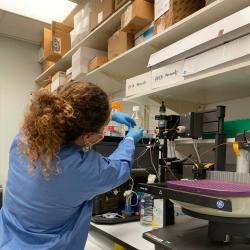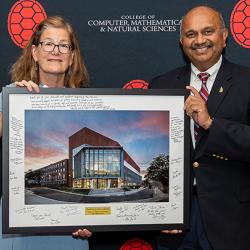Peter Nemes Receives Prestigious Award for Metabolism Research
The chemistry and biochemistry professor will lead a new project supported by a $500,000 grant from the Chan Zuckerberg Initiative.
Peter Nemes, a professor in the University of Maryland’s Department of Chemistry and Biochemistry, has been named principal investigator (PI) of a new project to better understand how metabolism and gene expression control cell development in animal models. The two-year research project is supported by a $500,000 grant from the Chan Zuckerberg Initiative (CZI) and includes two co-PIs: Professor Cecilia Lo and Assistant Professor Dennis Kostka, who both study developmental diseases at the University of Pittsburgh.

The award is part of CZI’s “Measuring Metabolism Across Scales” grant program, which supports collaborative research projects aimed at demystifying metabolism across organelles and cells, which can ultimately provide a better understanding of human health and disease. Award recipients tackle this problem from multiple angles, including studies of inter-organelle communication, enzyme function and more.
“This is a prestigious and competitive award and we're very excited to be among such an impressive company of awardees,” Nemes said. “Our project will utilize unique instruments that are custom-built in my laboratory to study the molecular underpinnings of single cells as they differentiate, giving rise to different kinds of tissues in a developing animal model."
Nemes and the co-PIs will paint a picture of metabolism and gene expression as it relates to the early development of two animal models—the South African clawed frog and mouse. After producing a “transcriptomic-metabolomic cell map” of the frog, the researchers will use artificial intelligence to predict the metabolic composition of cells in the mouse blastula, which are too tiny and challenging to analyze.
For this project, Nemes had to “push the limits” of detection sensitivity by developing a mass spectrometry instrument capable of measuring metabolites at ultrahigh sensitivity.
“My laboratory had to build the technologies to measure these small molecules because the tools did not previously exist. Part of that work was funded by the Arnold and Mabel Beckman Foundation,” Nemes said, referring to a Beckman Young Investigator award he received in 2015. “We are eavesdropping on metabolites that are made in a cell as it divides every 30 minutes or so to establish visceral tissues.”
Researchers across scientific fields are interested in better understanding cellular function, which is closely linked with developmental diseases. According to CZI, “By accelerating the development and application of single-cell tools and technologies, we can better understand how disease manifests in the body’s cells and tissues.”
Nemes believes that the tools developed in his lab could have broader applications for human health.
“Understanding what happens in the cell—and how single cells coordinate their molecular composition to carry out a particular function, such as the formation of specific tissues—is an overarching question across all branches of biology,” Nemes said. “We envision that the tools and approaches we’re developing with CZI will be adaptable in other model organisms and cells, ultimately helping to improve our knowledge of the cellular machinery that is responsible for healthy and diseased cell development.”







